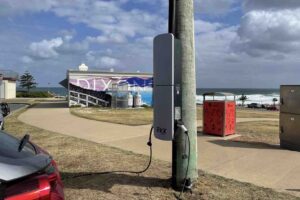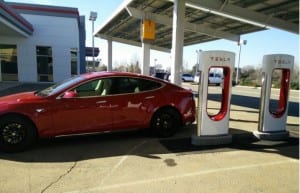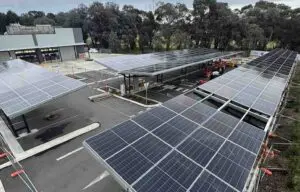Internet giant Google has announced a massive 1.6GW renewable energy buy-up, comprising 18 mostly solar off-take deals that will double the capacity of the company’s global solar portfolio to date and boost its entire renewable energy portfolio to 5.5GW.
The move, which Google itself described as “the biggest corporate purchase of renewable energy in history,” was announced in a company blog post on Thursday, just as the first of the global climate strikes begin to take place in Australia and other Pacific nations.
It came as internet rival Amazon announced what it described as the biggest ever order for electric vehicles, via start-up Rivian, as part of plans to go zero carbon by 2040, in line with 1.5°C targets. We cover that story in more detail on our EV-focused sister site The Driven.
Google – already the world’s largest corporate investor in renewables – will tip more than $2 billion into the construction of new large-scale solar and wind farms. (It is a condition of the company’s “additionality” criteria for energy purchases that commits it to using PPAs to drive the development of new projects.)
Google said the investments – which span across the US, South America and Europe – included the purchase of energy from 720MW of new solar farms in North Carolina (155 MW), South Carolina (75 MW), and Texas (490 MW).
In South America, the company is adding another 125MW of hybrid renewables capacity to the grid to supply its data centre in Chile. More details were yet to come about the Europe deals, which Pichai said he would announce in coming days from Finland.
“This purchase is made up of a 1,600-megawatt (MW) package of agreements and includes 18 new energy deals,” Google CEO Sundar Pichai said in the blog.
“Together, these deals will increase our worldwide portfolio of wind and solar agreements by more than 40 per cent, to 5,500 MW—equivalent to the capacity of a million solar rooftops.
“Once all these projects come online, our carbon-free energy portfolio will produce more electricity than places like Washington D.C. or entire countries like Lithuania or Uruguay use each year.”
In the blog post, Pichai notes that this latest deal has seen the company shift its focus from large-scale wind to solar, thanks to the huge falls in cost of PV generation.
The Chile deal, meanwhile, will be the internet Giant’s first hybrid renewables deal, combining solar and wind to better meet the power needs of Google’s Chilean data centre.
The huge news from Google comes amid a flurry of climate and clean energy announcements from major corporations, including the announcement from online retail giant Amazon that it was “done being in the middle of the herd” on climate, and would now aim to be net zero carbon by 2040.
A major part of this gear-up by Amazon, as announced by CEO Jeff Bezos on Thursday, will be delivered via the accelerated adoption of renewable energy, with new goals of sourcing 80 per cent renewables by 2024, and 100 per cent renewable by 2030. But the company has also announced the world’s largest ever corporate electric vehicle purchase deal, which you can read about in detail on The Driven.
And Swedish retail giant Ikea announced on the same day that its latest investments in two large solar plants in the US and a wind farm in Romania would take it past its goal of 100 per cent renewables, one year ahead of schedule.
Google, meanwhile, reached that goal in 2017 (and then again in 2018), when it became the first company of its size to match its entire annual electricity consumption with renewable energy.
On top of the new energy purchase announcement on Thursday, the company also announced the launch of two new grants to support other organisations grow the corporate renewables market.
“We’ll provide a $US500,000 grant to Renewable Energy Buyers Alliance (REBA) in the U.S. and a €500,000 grant to RE-Source in Europe …(to) help fund the development of new purchasing models, provide training and resources for consumers, and enable more widespread access to clean power,”Pichai said.










